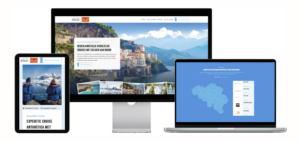From connections to partners.
This is also how it started for Matthias and Davy, business owners of Pitch Perfect. They met through mutual acquaintances, got talking, looked into cooperation possibilities and then officially got professionally "married" on 3 January 2019. Now more than 2 years later, Pitch Perfect is much further along than anyone ever imagined and we owe this to several things, but mainly to... NETWORKING. Networking is very important today to grow your business and this is another area we are constantly working on with Pitch Perfect.
At the moment, it is something that does not seem to be so easy because of "The Rona" which still throws a spanner in the works when it comes to events, trips, fairs, etc. Where we used to be among the people at Pitch Perfect on average two nights a week, we are now stuck at home behind our computers. So how do we keep expanding our network? Our two master networkers, Matthias and Davy, give some insights.

How do you expand your network now that there are no physical events and we cannot meet anyone?
Speaks for itself that what "is today" is in stark contrast to what was before. We have had to convert our networking completely digital instead of face-to-face. The desire to get to know people, combined with participating in the right online events is equally going to help broaden and expand one's network.
Platforms and online sessions that are of major importance today:LinkedIn, Voka (with, among others, the Netwekkers concept) & Unizo, Crowdfunding platforms and Networking sessions such as netwerkers.be. A cross-fertilisation of these tools makes the "us versus us" pay off. Networking today is more than ever about giving and receiving, asking how you can help another and finding out what you are looking for yourself. From a bigger picture, we end up with a "match" in a follow up call that develops further afterwards. Above all, remember that connecting in the first place is much more important than direct business.
What is the biggest difference between networks today and a few years ago?
The biggest difference is the lack of body language and facial expressions, which makes it more difficult to gauge each other. Apart from the aspect of largely lacking body language, online meetings are - strange but true - rather informal in character and extremely efficient. The basic principles of listening and giving information after you have listened are even more important online. Asking the right questions in order to establish the right relationships and a subsequent follow-up are the conditions for success. Thorough preparation and follow-up also work wonders.
Furthermore, time-consuming travel is saved, converting time is reduced and a partnership is established more quickly. It goes without saying that you have to pull the strings yourself in order to achieve results.
Networking and sales often go together, but where is the difference between the two?
Both are founded on trust. Networking is making contacts, looking at collaboration opportunities, establishing links with others and their product or service. It leads to expanding opportunities based on give and take. Sales is more detailed, more to-the-point and seeing the connection, turning that trust into action, realising a partnership and ultimately closing a deal.

What is the most important channel online and/or offline to expand your network qualitatively?
There are a lot of different channels that matter for different types of businesses. Of all the platforms we use on a daily basis and if we analyse based on measurable factors, LinkedIn is qualitatively the strongest tool. LinkedIn provides the match and traffic towards the website, but one has to generate the business themselves. If you want to get something out of LinkedIn, an initial online introduction is optimal. We know from experience that once interest is very high, a live meeting immediately triples the chance of conversion.
A good mix between online and offline is and remains primordial. Think outside your comfort zone and look for opportunities outside your own sector or field. Also think about making network contacts based on your own interests. Vintage cars, golf, football, cycling... there are many different interests that can be used to make contact with others.



